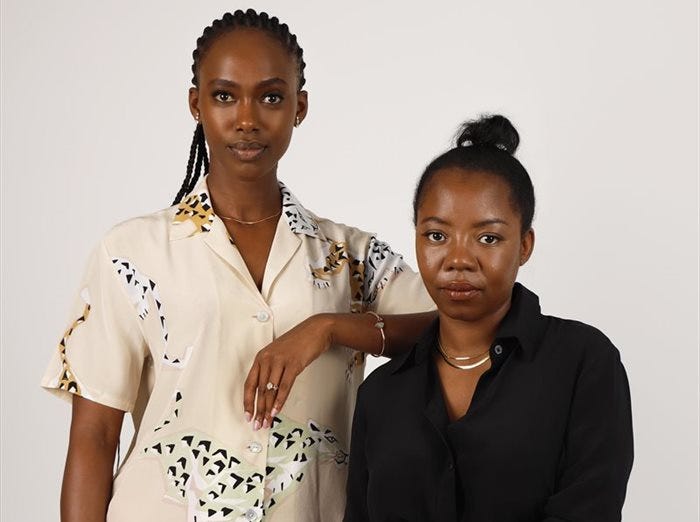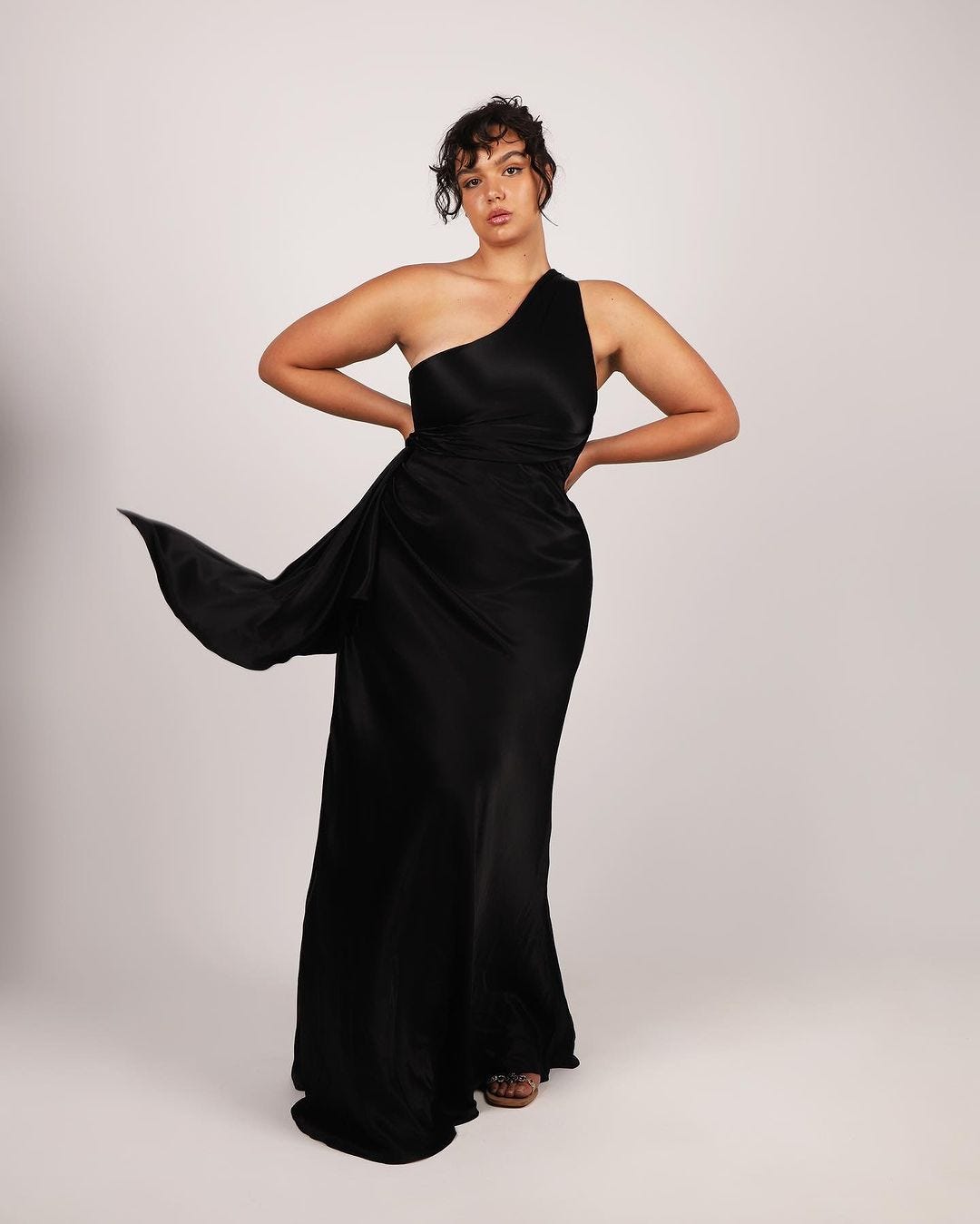Owning clothes is so over - how Closet Runway is making rental fashion work in South Africa
Making African labels more accessible, prioritising sustainability and meeting dress-up culture in one fell swoop, I chat to the founders of Closet Runway about rental fashion.
You've probably heard of a lot of really big takeaways from the Barbie movie but one of the most notable, at least for fashion, is that we're fully in the age of dressing up more. On my viewing, every single person at the cinema was wearing pink. Almost every event now comes with a dress code, be it colour, time period or whatever the Durban July meant by “out of this world”.
In the wake of the pandemic, we're no longer taking the ability to go outside for granted and we're also increasingly documenting our lives and habits for social media. However, living life like a Gossip Girl character, with new outfits for every event of the week, doesn't bode well for our wallets, consumption habits and the effect on the planet. This is where rental fashion enters the chat.
But what is rental fashion? How does it work? Is it actually more sustainable? And what is available locally to South Africans? I recently spoke to Ange-Nicole Mahoro and Evelina Nailenge, the women behind the Cape Town-based luxury rental company, Closet Runway to figure it all out.
Rental fashion is pretty much what it sounds like: the process of borrowing garments for a short period of time. Celebrities and their stylists do this often, procuring items from high-end designers for movie premieres, galas, and high-profile events. While some items are bought, it's not often that any celebrity actually owns all of those ball gowns and fine jewellery. It's been out of reach for regular people until the 2020s—the earliest “widespread” example I can think of are the ugly Louis Vuitton purses Jennifer Hudson's character was renting in the Sex and the City movie, and up until recently, I think rental has been associated with poser attitudes as opposed to a facet of the sharing economy.
We already engage in communal services like Uber and Airbnb. With the plethora of clothing in production and the landfills piling up, it only makes sense that fashion goes into that rotation. Plus when you think about how many of us receive hand-me-downs or have our siblings steal our favourite tops, we've always been doing this. Just in an informal way.
Ange and Evelina founded Closet Runway with sustainably as a key factor.
“The business model is basically clothing rental from a reputable sustainable brand,” Evelina explains. “So that means we buy from businesses that we know. Like, for instance, I know Meskhi has employed people who are paid fair wages.”
And just as important is the quality of construction. “[An item] must be rented multiple times, it must be able to be washed multiple times. We need to give it to the next customer and the next customer, so the fabrics must be able to withstand constant cleaning and wear and tear.”
Closet Runway takes care of all the dry cleaning and delivery for their customers. They courier nationwide and have built relationships with local cleaners to launder the items. As a renter, you just have to wear your item and arrange a time for return.
One of the biggest deterrent for people considering rentals is availability. Most local rental services have limited sizing options and rarely cater to men. One challenge is being a small business in a new market—as demand and interest in rental increases, so will their ability to source a greater range of garments and meet more diverse interests. Another, interestingly enough, lies with the fashion industry as a whole.
In the beginning, the pair sourced a lot of their clothing online and would come across size discrepancies. What was listed as medium or large on an American or European site often arrived much smaller than that. Plus it's already difficult to find good plus-size clothing brand new, so this two-fold at rental.
“Now what we're doing to fix that problem is looking at new brands for us to source from,” says Evelina, adding that they're specifically looking for styles in 2XL and above. Ange and Evelina also note that they had to come over their own internal biases as well as adjusting to the demands of the South African market.
“It's almost like we had to recondition ourselves,” Evelina says. Ange is from Burundi and Evelina from Namibia, where the approach to dress is a little different. Ange adds, “We noticed that in South Africa, there is [more] body positivity as opposed to where I'm from, if someone is big they tend to cover up.” Moving forward, the new brands they source from will also need to be ones that treat their plus-size consumers the same as the 'straight size' ones.
Speaking of new brands, I wanted to know more about the challenges housing African labels on the platform. The current inventory includes designs from MESHKI, Rat and Boa, Aje and Reformation, and then there are some African names like Thebe Magugu, Andrea Iyamah, and MaXhosa. Having previously worked in luxury African retail, I know most regional designers work on made-to-order models with limited quantities which doesn't always translate beyond direct-to-consumer selling.
Evelina and Ange are attempting to court more African labels. Last year they met the duo behind Mmuso Maxwell and MaXhosa's Laduma Ngxokolo. “They were excited about the concept,” Evelina says. However, there's shared risk for everyone involved with brands like Mmuso Maxwell being just as new as Closet Runway. Mmuso Maxwell had just recently launched a website for the first time, a project that had been in the works for years. Resources and obtaining the right infrastructure is still a major roadblock to emerging local brands.
“We're all small businesses,. No one has gigantic budgets available at the drop of a hat.” Evelina and Ange observe that it's a matter of rising tides lifting boats. The success of their concept also depends on the success of local design and manufacturing overall.
South African designers don't just need buy-in from the public, which we can argue they have, though rentals present a great opportunity for these brands to reach more consumers in ways their price points can't. “MaXhosa was like, 'this is brilliant, I want more people to be able to wear my stuff. I know not everyone can afford that price point,' which is part of the problem we're solving.”
But beyond consumer interest, there needs to be infrastructure and resources in place to make these brands work as businesses. Andrea Iyamah, Thebe Magugu and MaXhosa fortunately have functional DTC stores or are stocked at trusted retailers—Evelina and Ange have been able to rely on Merchants on Long for sourcing when they couldn't purchase directly. Rental means that in a future where designers and brands are able to solidify their production and retail, they will still have a way to reach the people outside of luxury pricing, working in an interconnected local ecosystem.
I've mentioned before that another point for rental is that it's an easier entry point to new and luxury brands. If you're going to make the kind of commitment that involves thousands of Rands, why not use this as an opportunity to test out the clothing at a fraction of the cost. Something like Thebe Magugu's Tsonga dress is available to borrow at about 7% of the retail price. Discover the fit, construction, and materials and see for yourself if something is worth it. On a lesser level, I think you can even apply this to trend experimentation. You won't have to accumulate items you won't wear anymore when you can have 3-5 days to see if something actually suits you.
If you're in Cape Town, Closet Runway does have a store in De Waterkant that you can visit, otherwise you can check out their website to see all of their offerings.
Until next time, you know you love me.




